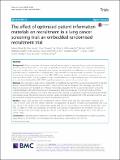Files in this item
The effect of optimised patient information materials on recruitment in a lung cancer screening trial : an embedded randomised recruitment trial
Item metadata
| dc.contributor.author | Parker, Adwoa | |
| dc.contributor.author | Knapp, Peter | |
| dc.contributor.author | Treweek, Shaun | |
| dc.contributor.author | Madhurasinghe, Vichithranie | |
| dc.contributor.author | Littleford, Roberta | |
| dc.contributor.author | Gallant, Stephanie | |
| dc.contributor.author | Sullivan, Frank | |
| dc.contributor.author | Schembri, Stuart | |
| dc.contributor.author | Rick, Jo | |
| dc.contributor.author | Graffy, Jonathan | |
| dc.contributor.author | Collier, David J. | |
| dc.contributor.author | Eldridge, Sandra | |
| dc.contributor.author | Kennedy, Anne | |
| dc.contributor.author | Bower, Peter | |
| dc.date.accessioned | 2018-09-24T16:30:07Z | |
| dc.date.available | 2018-09-24T16:30:07Z | |
| dc.date.issued | 2018-09-18 | |
| dc.identifier | 255966798 | |
| dc.identifier | 7a8e8824-1748-4d21-91fe-2caf83f6ed24 | |
| dc.identifier | 85053680721 | |
| dc.identifier | 000445430700001 | |
| dc.identifier.citation | Parker , A , Knapp , P , Treweek , S , Madhurasinghe , V , Littleford , R , Gallant , S , Sullivan , F , Schembri , S , Rick , J , Graffy , J , Collier , D J , Eldridge , S , Kennedy , A & Bower , P 2018 , ' The effect of optimised patient information materials on recruitment in a lung cancer screening trial : an embedded randomised recruitment trial ' , Trials , vol. 19 . https://doi.org/10.1186/s13063-018-2896-9 | en |
| dc.identifier.issn | 1745-6215 | |
| dc.identifier.other | RIS: urn:601374B6962E9A23B328080C80DFED6C | |
| dc.identifier.other | RIS: Parker2018 | |
| dc.identifier.other | ORCID: /0000-0002-6623-4964/work/48774910 | |
| dc.identifier.uri | https://hdl.handle.net/10023/16072 | |
| dc.description | The ECLS trial is funded by the Chief Scientist Office of the Scottish Government and Oncimmune Ltd. The MRC START programme is funded by the MRC Methodology Research Programme (grant reference G1002325). Materials relating to the MRC START programme can be found in the protocol and on the University of Manchester website (http://www.population-health.manchester.ac.uk/mrcstart/). The Health Services Research Unit, University of Aberdeen, receives core funding from the Chief Scientist Office of the Scottish Government Health Directorates. | en |
| dc.description.abstract | Background: Written participant information materials are important for ensuring that potential trial participants receive necessary information so that they can provide informed consent. However, such materials are frequently long and complex, which may negatively impact patient understanding and willingness to participate. Improving readability, ease of comprehension and presentation may assist with improved participant recruitment. The Systematic Techniques for Assisting Recruitment to Trials (MRC START) study aimed to develop and evaluate interventions to improve trial recruitment. This study aimed to assess the effectiveness of an optimised participant information brochure and cover letter developed by MRC START regarding response and participant recruitment rates. Methods: We conducted a study within a trial (SWAT) embedded in the EarlyCDT Lung Cancer Scotland (ECLS) trial that aimed to assess the effectiveness of a new test in reducing the incidence of patients with late-stage lung cancer at diagnosis compared with standard care. Potential participants approached for ECLS were randomised to receive the original participant information brochure and accompanying letter (control group) or optimised versions of these materials which had undergone user testing and a process of re-writing, re-organisation and professional graphic design (intervention group). The primary outcome was the number of patients recruited to ECLS. The secondary outcome was the proportion of patients expressing an interest in participating in ECLS. Results: In total, 2262 patients were randomised, 1136 of whom were sent the intervention materials and 1126 of whom were sent the control materials. The proportion of patients enrolled and randomised into ECLS was 180 of 1136 (15.8%) in the intervention group and 176 of 1126 (15.6%) in the control group (OR = 1.016, 95% CI, 0.660 to 1.564). The proportion of patients who positively responded to the invitation was 224 of 1136 (19.7%) in the intervention group and 205 of 1126 (18.2%) in the control group (OR = 1.103, 95% CI, 0.778 to 1.565). Conclusions: Optimised patient information materials made little difference to the proportion of patients positively responding to a trial invitation or to the proportion subsequently randomised to the host trial. | |
| dc.format.extent | 607608 | |
| dc.language.iso | eng | |
| dc.relation.ispartof | Trials | en |
| dc.subject | Recruitment | en |
| dc.subject | Patient information | en |
| dc.subject | Research methodology | en |
| dc.subject | Randomised controlled trial | en |
| dc.subject | Study within a trial (SWAT) | en |
| dc.subject | RA Public aspects of medicine | en |
| dc.subject | NDAS | en |
| dc.subject | SDG 3 - Good Health and Well-being | en |
| dc.subject.lcc | RA | en |
| dc.title | The effect of optimised patient information materials on recruitment in a lung cancer screening trial : an embedded randomised recruitment trial | en |
| dc.type | Journal article | en |
| dc.contributor.institution | University of St Andrews. School of Medicine | en |
| dc.contributor.institution | University of St Andrews. Population and Behavioural Science Division | en |
| dc.identifier.doi | https://doi.org/10.1186/s13063-018-2896-9 | |
| dc.description.status | Peer reviewed | en |
This item appears in the following Collection(s)
Items in the St Andrews Research Repository are protected by copyright, with all rights reserved, unless otherwise indicated.

